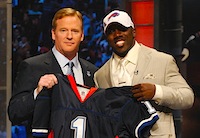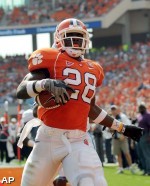 As I have likely already mentioned here, I have recently read a book titled, “A Thomas Jefferson Education: Teaching a Generation of Leaders for the 21st Century” by Oliver DeMille. Having listened to a recorded seminar—and as someone who has chosen to not send his kids through the public school system—I knew going in that I agreed with a lot of the ideas from the book.
As I have likely already mentioned here, I have recently read a book titled, “A Thomas Jefferson Education: Teaching a Generation of Leaders for the 21st Century” by Oliver DeMille. Having listened to a recorded seminar—and as someone who has chosen to not send his kids through the public school system—I knew going in that I agreed with a lot of the ideas from the book.
One thing that I took issue with early on, however, was simply the word, “Education.”
From the beginning, DeMille says repeatedly that we need to make sure we have a great education. That we need to have better educations. That it is paramount to have an excellent education. For some reason, though, every time I read the word, I had a negative reaction to it.
Why would that be? Do I not think that there are problems with the education system that needs to be addressed? No, that’s not it. It’s the major reason we don’t send our kids there. That’s not the education they need. (Among many other things they don’t need.)
Am I just weary of hearing year after year, in every town I’ve ever been in, “We need to improve our education system! Our kids need a better education!” Could be that. Especially since the call for educational improvements seems to go almost completely unheeded. (Or, if heeded, the attempted fixes apparently don’t do the job, evidenced by the fact that we all continue to bemoan the current education system!)
Really what I think it was for me was that I was operating on a poor definition of the word education.
The author contends that an education is something you must earn yourself. It’s what you actually learn and take away from your study and from any teaching or instruction you have received. Also important to his definition is that, “You can not educate anyone, they must educate themselves.”
Schooling is the opposite idea in that the end goal is that the recipient is only intended to have the information that is being taught; not do the work to get there, thus earning the education. (Doing the work to educate yourself allows for knowing how to think, not just what to think.)
The further I read into the book, the more I understood this distinction he was putting forth.
And, the more I agreed.
Public school is not by default an incompetent educational system, nor a bad choice. (The author of A Thomas Jefferson Education is not suggesting that, either.) But public schools operate on the “conveyor belt” idea, where the object is to get everyone to a certain standard set of “knowledge” in a set amount of time (at the preset times). Thus, the system is set up to teach students what to think, rather than how to think.
There are exceptions to the rule in any given school, or classroom, but that principle is generally true, just by the nature of the system or structure we have created.
And I believe that is what made me cringe every time he said that we need to help our kids (and ourselves) get a better “education.”
What he helped me understand is that, first of all, I did somehow get a good education. I have always loved to learn. I love documentaries, including what my Dad and I called, “nature shows.” We have watched many of those together over the years. Definitely have always loved to read. And from that reading and learning to think more on it, and then to discuss with others or write about it. (Like I am often found doing on these pages.)
(Note: I mainly say “somehow” in regards to my education because I was not a great student. I generally received good grades, but I did so without much effort at all. And I frequently did not complete—or even start—homework assignments, much to the chagrin of my parents. Thus, that statement is not intended as any sort of condemnation of my own various schools or teachers.)
I also have always really enjoyed listening to classical music, which they say stimulates the brain… perhaps that’s it? 🙂
Whatever the reason, I do have a love for learning that seems unquenchable, and that, too me, is a sign of a good education. That’s what we want to instill in our children as well. A good, strong sense of right and wrong, of character and how to treat others, and a full and rich love for learning—especially in the subjects that matter most to them.
So how does that happen? How do we first, give our kids (and ourselves?) a good education, and second, how do we spark that love for learning in them?
DeMille and friends would suggest using a system of “mentors and the classics.” I don’t want to get into a full review of the book here (it’s a pretty short book, actually, perhaps you can get a copy for yourself, and we can discuss more fully at a later juncture?) but I do really like—and feel that we have implemented—the teaching model they suggest.
I’ve always said that we learn from life. It’s not a separate thing. It’s not a separate time. All of life—from the moment you are conscious in the morning, to the moment you go to sleep at night… well, and sometimes during sleep!—we are learning. There is something to be learned, or, as a parent/mentor, to teach. A parenting course we have loved over the years says to train in “moments of non-conflict,” and we regularly look for opportunities to do so.
The idea of learning from mentors and from the classics is similar to that. Rather than picking up a text book and plowing through what someone has written about a subject, often you can learn directly from an important thinker or doer on the subject in a classic piece of literature, or art, or even a person or a movie or play. Really, it can be anything that makes us think on a deeper level, and ultimately challenges us to think about who we are and who we want to be.
It was fascinating to see how he suggested that all disciplines can be studied and mastered through this method, simply by reading what the greatest minds have said on any particular subject. Want to learn science? Read Newton. Want to learn math? Read Copernicus. And so on.
It has definitely inspired Jen, not only as a teacher, but likely even more so as a learner. That’s pretty amazing. I’m loving learning along with my wife as she keeps discovering things about herself and the world around her. (How sad is it that, for her, this hasn’t really been happening until her 36th year of life?!)
Oh, one more important thing from the book, and the reason for the title. When DeMille was studying methods of education, he found repeatedly that the model of great teachers (mentors) inspiring students to get great educations was the model by which nearly every great leader—ever—was educated. Every one. Interestingly, including all of the men we call the Founding Fathers. The ones who helped create this country, whose freedom for the individual has never before nor since been equalled.
Chief among those learned men was Thomas Jefferson. His education was astounding. He spoke multiple languages, was a master of several different trades/fields, and as we all know, he was also the writer of the Declaration of Independence, one of the greatest proclamations ever penned of man’s inherent right to live free.
Where are those people today? Some are in research fields, making great discoveries. Some are teaching in institutions of higher education. (But, showing my personal bias, I’d say those folks are different, as, though they are also quite learned, they tend to get a bit stuffy and irrelevant in their positions in academia.) But the combination of a great education, great wisdom, along with great character and courage don’t seem to exist currently. Especially as selflessly as can be seen in those men who were willing to sacrifice literally everything (and some did!) to preserve freedom for their families and fellow countrymen.
Is that what a good education can produce? Not just smart people who know lots of things… but honorable people? Men and women of courage, and character, and integrity? We think so. And, that’s why we are giving our kids the best opportunities, to the best of our abilities, to get an excellent education. Not just to know what to think, but how to think.
Moreover, how to really live life. And live to the full.


 As I have likely already mentioned here, I have recently read a book titled, “
As I have likely already mentioned here, I have recently read a book titled, “ The Buffalo Sabres 2009-2010 season ended tonight in Boston. They were the losers of Game 6 of the best of seven first round series, and that loss closed the doors on only the sixth season where Buffalo were the champions of their division.
The Buffalo Sabres 2009-2010 season ended tonight in Boston. They were the losers of Game 6 of the best of seven first round series, and that loss closed the doors on only the sixth season where Buffalo were the champions of their division. You really never know right away how well a team fared with their draft selections. There are some who love every pick, some who love a few, and of course, many who hate everything about the picks. And all this despite the fact that you rarely know how a draft actually pans out for at least two or three years. It never matters, we all feel the need to “grade” or in some way rate the picks of our favorite teams.
You really never know right away how well a team fared with their draft selections. There are some who love every pick, some who love a few, and of course, many who hate everything about the picks. And all this despite the fact that you rarely know how a draft actually pans out for at least two or three years. It never matters, we all feel the need to “grade” or in some way rate the picks of our favorite teams. Here’s the list of the 2010 picks:
Here’s the list of the 2010 picks: